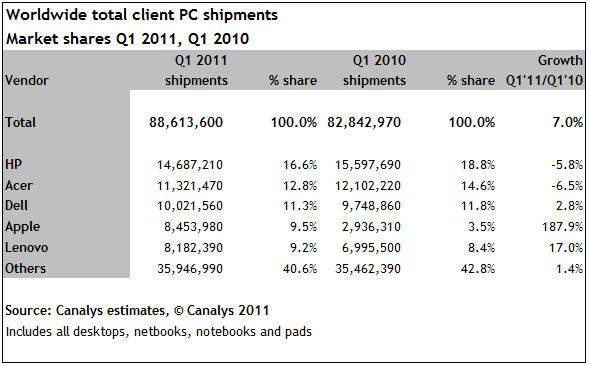PC gone mad
As one of the smaller market researchers, Canalys tries to do things a bit differently; proudly announcing it was ‘the first analyst company to include pads within its PC market results.'
By this it means tablets, of course, and today Canalys published its figures for Q1 worldwide PC shipments. They revealed year-on-year growth of seven percent, which represented an. increase of 5,770,630 units. The Canalys estimate for tablets shipped last quarter was 6.4 million units, so without tablets, PC growth would have been negative, which is consistent with the findings of larger researchers.
"Taking into consideration the iPad's ‘halo effect' on the company's other products, Apple has grown considerably in most markets worldwide," said Canalys analyst Tim Coulling. "As the iPad 2 and its competitors continue to roll out, we expect pad sales to propel PC market growth for the rest of the year."
The Canalys table is below and, as you can see, nearly all the growth comes from Apple. The analysis states that 6.4 million tablets were shipped in Q1, with 74 percent of those being iPads, which comes to 4.736 million. Apple itself declared Q1 iPad sales of 4.69. The total increase in Apple PC shipments was 5.518 million, so the halo effect on Macs, if indeed that was the main cause of Mac growth (which is debatable), amounts to 782,000 units, which is quite a lot.

There are several reasons why we think Canalys is mistaken in putting tablets in the PC category. Firstly, this distorts the PC figures. Canalys dedicated a lot of its analysis to looking at the tablet market in isolation, thus defeating the object of bundling it into the PC category. It also remains likely that the channels for the two types of device will remain quite disitinct from each other.
PCs existed for decades before tablets came along and are generally considered to be quite a different proposition to PCs. Canalys points to a recent Western European consumer survey as evidence that, because people predominantly use tablets for web-browsing and email, they are more like PCs than media players or e-readers.
That may well be the case, but it's also true of smartphones, and Canalys is presumably not contemplating conflating the smartphone and PC markets. To say a tablet is not an e-reader and so is therefore a PC is a false dichotomy.
"This broad usage pattern reinforces the pad's role as a general-purpose computing device, and much more than just a consumption device," said Coulling. "The pad represents a real threat to PC and consumer electronics vendors, as it is capable of replacing devices in a range of other categories."
We agree with all of this, but it further reinforces our belief (and Steve Jobs', for that matter) that tablets are a separate and distinct category of their own. They have predominantly smartphone components and smartphone operating systems, but they're clearly not just big phones. Neither are they PCs, however, and the very fact that tablets are so disruptive to the technology market demands they be measured and analysed as a category to themselves.













